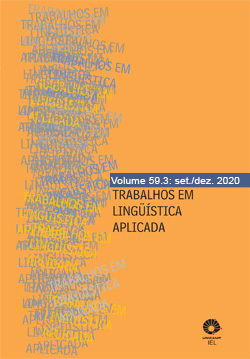Abstract
This article analyzes how semiotic practices and subjectivities are performed on the popular image-based social media platform Instagram by Djankaw, a Black trans resident of a quilombo [a settlement founded by descendants of formerly enslaved African-Brazilians]. We aim to observe how, through Djankaw’s posts, they perform their subjectivities on the platform, focusing on the intersections of race, class, ethnicity, and sexuality they produce online. The community where Djankaw lives faces many problems as their territory has been under dispute in court with Swabian landowners and the capitalist monoculture business they practice. It took considerable legal action for the quilombolas to be given back part of their ancestral territory. Bearing these legal disputes in mind, we turn to Djankaw’s performances on the Internet and how these performances instigate a productive debate over the African-Brazilian quilombola identity itself and resonate with the struggles of marginalized groups to reclaim their diverse time-spaces in the interior of Brazil. Djankaw’s posts and their embodied practices operate as sites to question the meanings of what it means to be Black, trans, and quilombola [an inhabitant of a quilombo]. The complexity of Djankaw’s subject positions is further increased by their connection to different religions; they incorporate different spiritual practices that also orchestrate discussions on race, sexuality, and gender. When Djankaw performs their selves on the internet, they mobilize and re-shape these social marks while both engaging in semiotic practices of resistance against the historical erasure of quilombola cultures and claiming space on social networks.
References
BONFANTE, Gleiton. (2016). Erótica dos signos em aplicativos de pegação: processos multissemióticos em performances íntimo-espetaculares de si. Rio de Janeiro: Editora Multifoco.
BRAZIL. (2003) Decreto-lei n. 4. 887, de 20 de novembro de 2003. Regulamenta o procedimento para identificação, reconhecimento, delimitação, demarcação e titulação das terras ocupadas por remanescentes das comunidades dos quilombos de que trata o art. 68 do Ato das Disposições Constitucionais Transitórias, Brasília, DF.
BRAZIL. (1988) Constituição. Artigo 68 do ADCT – Direito à Propriedade das terras das comunidades remanescentes de quilombo.
BUTLER, Judith. (2018). Corpos em aliança e a política das ruas: notas para uma teoria performativa de assembleia. Rio de Janeiro: Civilização Brasileira.
CAMARGO, Mabia. (2019) “Acuenda esse bajubá: indexicalidades e interseccionalidades nas performances narrativas de uma travesti quilombola.” Doctoral dissertation. Universidade Federal do Rio de Janeiro.
CARVALHO, Roberta; LIMA, Gustavo da Costa. (2013). Comunidades Quilombolas, Territorialidade e a Legislação no Brasil: uma análise histórica. Revista de Ciências Sociais, no. 39, 329-346.
COUPLAND, Nikolas. (2007). Style: language variation and identity. Cambridge University Press.
CRENSHAW, Kimberlé. (1994) Mapping the Margins: Intersectionality, Identity Politics, and Violence Against Women of Color. New York: Routledge.
CRUZ, Marcelus, et al. (2006). “Quilombos: referência de resistência à dominação e luta pela terra no Paraná”. In: História e cultura afro-brasileira e africana: educando para as relações étnico-raciais. Cadernos Temático. Curitiba: Secretaria de Estado do Paraná.
DELEUZE, Gilles. (2002) Espinosa: Filosofia prática. São Paulo: Escuta.
FABRÍCIO, Branca Falabella. (2015) Policing the borderland in a digital lusophone territory. In: MOITA LOPES, L. P. Global Portuguese: Linguistic ideologies in late modernity. New York: Routledge, 2015.
FABRÍCIO, Branca Falabella. (2020) Viagens textuais em tempo de crise. Contxt. http://contxt.letras.ufrj.br/blog/item/22-viagens-textuais.html>. Last access on September 14, 2020.
GOMES, Flávio dos Santos. (2015). Mocambos e quilombos: uma história do campesinato negro no Brasil. São Paulo: Claro Enigma.
GOMES, Nilma Lino. (2019). A compreensão da tensão regulação/emancipação do corpo e da corporeidade negra na reinvenção da resistência democrática. Revista Perseu, n. 17, ano 12.
HARTUNG, Mirian. (2013). "Ser E não ser", eis a questão: relatórios antropológicos, categorias nativas e Antropologia. Revista de Antropologia, USP: São Paulo, v. 56, n. 2, 2013.
HARTUNG, Mirian. (2004). O sangue e o espírito dos antepassados: escravidão, herança e
expropriação no grupo negro Invernada Paiol de Telha. Florianópolis: NUER/UFSC.
FOUCAULT, Michel. (1978). History of sexuality. Volume 1: An introduction. New York Pantheon Books.
O’RILLEY, Tim. (2007). What Is Web 2.0: Design Patterns and Business Models for the Next Generation of Software. Communications & Strategies, n. 65, p. 17-37.
PENNYCOOK, Alastair. (2007). Global Englishes and transcultural flows. New York: Routledge.
POULSEN, Søren Vigild; KVÅLE, Gunhild; LEEUWEN, Theo van. (2018). Special Issue: Social media as semiotic technology. Routledge: Social Semiotics, vol. 28, n. 5, p. 593-600.
RASSI, Natalie. (2016). Empowerment, control & the female body: is Instagram a platform for change? University of Ottawa: Canada.
REIS, João José; MAMIGONIAN, Beatriz Gallotti. (2004). “Nagô and Mina: The Yoruba Diaspora in Brazil.” In: Falola, T.; Childs, M. D. The Yoruba diaspora in the Atlantic world. Bloomington: Indiana University Press, p. 77-110.

This work is licensed under a Creative Commons Attribution 4.0 International License.
Copyright (c) 2021 Trabalhos em Linguística Aplicada


